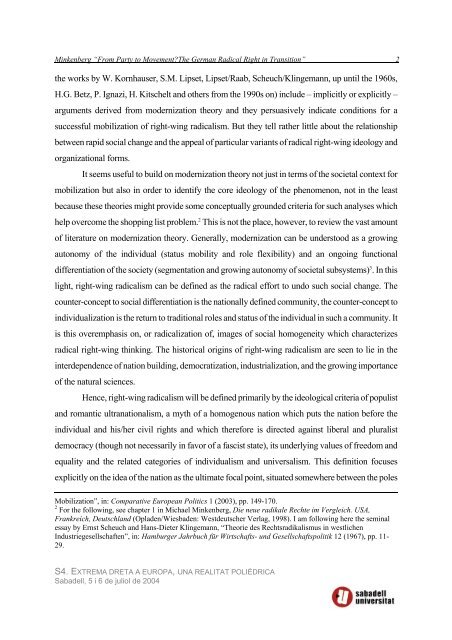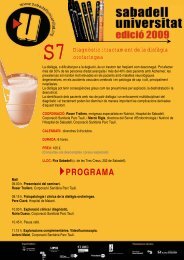From Party to Movement? The German Radical Right
From Party to Movement? The German Radical Right
From Party to Movement? The German Radical Right
You also want an ePaper? Increase the reach of your titles
YUMPU automatically turns print PDFs into web optimized ePapers that Google loves.
Minkenberg “<strong>From</strong> <strong>Party</strong> <strong>to</strong> <strong>Movement</strong>?<strong>The</strong> <strong>German</strong> <strong>Radical</strong> <strong>Right</strong> in Transition” 2<br />
the works by W. Kornhauser, S.M. Lipset, Lipset/Raab, Scheuch/Klingemann, up until the 1960s,<br />
H.G. Betz, P. Ignazi, H. Kitschelt and others from the 1990s on) include – implicitly or explicitly –<br />
arguments derived from modernization theory and they persuasively indicate conditions for a<br />
successful mobilization of right-wing radicalism. But they tell rather little about the relationship<br />
between rapid social change and the appeal of particular variants of radical right-wing ideology and<br />
organizational forms.<br />
It seems useful <strong>to</strong> build on modernization theory not just in terms of the societal context for<br />
mobilization but also in order <strong>to</strong> identify the core ideology of the phenomenon, not in the least<br />
because these theories might provide some conceptually grounded criteria for such analyses which<br />
help overcome the shopping list problem. 2 This is not the place, however, <strong>to</strong> review the vast amount<br />
of literature on modernization theory. Generally, modernization can be unders<strong>to</strong>od as a growing<br />
au<strong>to</strong>nomy of the individual (status mobility and role flexibility) and an ongoing functional<br />
differentiation of the society (segmentation and growing au<strong>to</strong>nomy of societal subsystems) 3 . In this<br />
light, right-wing radicalism can be defined as the radical effort <strong>to</strong> undo such social change. <strong>The</strong><br />
counter-concept <strong>to</strong> social differentiation is the nationally defined community, the counter-concept <strong>to</strong><br />
individualization is the return <strong>to</strong> traditional roles and status of the individual in such a community. It<br />
is this overemphasis on, or radicalization of, images of social homogeneity which characterizes<br />
radical right-wing thinking. <strong>The</strong> his<strong>to</strong>rical origins of right-wing radicalism are seen <strong>to</strong> lie in the<br />
interdependence of nation building, democratization, industrialization, and the growing importance<br />
of the natural sciences.<br />
Hence, right-wing radicalism will be defined primarily by the ideological criteria of populist<br />
and romantic ultranationalism, a myth of a homogenous nation which puts the nation before the<br />
individual and his/her civil rights and which therefore is directed against liberal and pluralist<br />
democracy (though not necessarily in favor of a fascist state), its underlying values of freedom and<br />
equality and the related categories of individualism and universalism. This definition focuses<br />
explicitly on the idea of the nation as the ultimate focal point, situated somewhere between the poles<br />
Mobilization”, in: Comparative European Politics 1 (2003), pp. 149-170.<br />
2 For the following, see chapter 1 in Michael Minkenberg, Die neue radikale Rechte im Vergleich. USA,<br />
Frankreich, Deutschland (Opladen/Wiesbaden: Westdeutscher Verlag, 1998). I am following here the seminal<br />
essay by Ernst Scheuch and Hans-Dieter Klingemann, “<strong>The</strong>orie des Rechtsradikalismus in westlichen<br />
Industriegesellschaften”, in: Hamburger Jahrbuch für Wirtschafts- und Gesellschaftspolitik 12 (1967), pp. 11-<br />
29.<br />
S4. EXTREMA DRETA A EUROPA, UNA REALITAT POLIÈDRICA<br />
Sabadell, 5 i 6 de juliol de 2004













